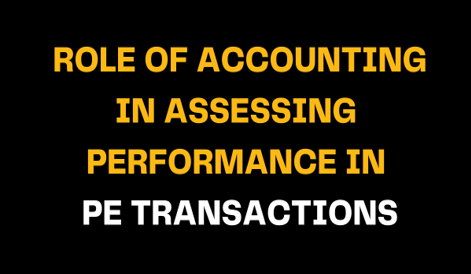Read Time4 Mins
Private equity (PE) transactions are complex deals that can significantly impact a company’s accounting and performance. These transactions can take many forms, such as leveraged buyouts (LBOs), growth capital investments, or distressed debt purchases. While these deals can bring many benefits to companies, they also require careful consideration of their accounting and performance implications.
We will explore how private equity transactions affect accounting and performance
Impact on Accounting
One of the most significant impacts of private equity transactions is on a company’s accounting. These transactions often involve significant changes in a company’s financial structure and require complex accounting adjustments. For example, in an LBO, a private equity firm will typically acquire a company using a combination of equity and debt. This debt is usually secured against the company’s assets, and the company’s financial statements must reflect this change in debt structure.
Another accounting consideration is the valuation of the company’s assets and liabilities. Private equity firms will often look to restructure the company’s balance sheet, which can result in a revaluation of assets and liabilities. This can have a significant impact on a company’s financial statements and can lead to changes in its reported earnings.
Additionally, private equity transactions can have implications for a company’s tax accounting, considering the use of tax-efficient structures such as holding companies. It is essential to consider these implications when evaluating private equity transactions and utilizing family office software can help navigate these complexities.
Impact on Performance
Private equity transactions can also have a significant impact on a company’s performance. Private equity firms typically invest in companies that they believe have significant growth potential but may require operational improvements. These firms often work closely with management teams to implement operational changes, such as improving cost management or increasing revenue.
One of the primary ways that private equity firms drive performance is by focusing on cash flow. These firms typically look to increase cash flow by reducing costs and improving operating efficiency. They may also look to increase cash flow by implementing pricing strategies or expanding the company’s product lines.
Another way that private equity firms drive performance is through financial engineering. This involves using financial instruments to optimize a company’s capital structure and improve its financial performance. For example, a private equity firm may use debt to fund share buybacks or pay dividends, which can improve the company’s financial metrics.
Finally, private equity transactions can have an impact on a company’s strategic direction. Private equity firms typically invest in companies with the aim of improving their performance and ultimately achieving a successful exit. As a result, they may look to implement strategic changes, such as entering new markets or divesting non-core assets.
Conclusion
Private equity transactions can have a significant impact on a company’s accounting and performance. These deals require careful consideration of their accounting implications, including changes to a company’s financial structure, asset and liability valuations, and tax accounting.PE transactions can also drive performance improvements through operational changes, financial engineering, and strategic direction. By understanding the accounting and performance implications of PE transactions, companies can make informed decisions when evaluating these deals.







